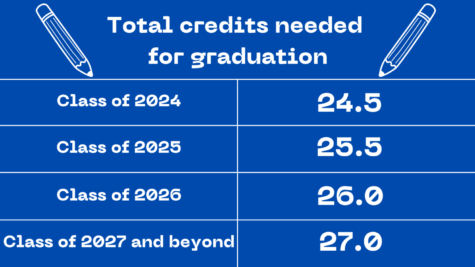Four tips for four years in high school
Counselors help students adjust their schedules and plan for their futures.
Thoughtfully choosing your classes can help you be more successful after high school, whether in higher education or a career. If you don’t have a plan yet, there’s plenty of opportunities to take classes and figure out what you’re interested in. You should consider how many credits you need to graduate. With the new eight-period schedule next year, graduating classes have different credit requirements. The forecasting process can be confusing and overwhelming, so make sure you’ve taken your time and finalized your schedule with your counselor.

Helpful tips for forecasting:
- Request required classes
You may want to focus on what core classes you’ll be taking first, as they’re required for almost all four years. English, math, science, and social studies are all required core classes. An English credit is required for each year of high school, and the requirements for the other core subjects vary. Refer to the Academic Program Guide to see what your options are based on what classes you’ve already taken, and to see where each class will take you in the future. If you have a couple options in a subject, like math, you may want to talk to your current teacher or your counselor about which class is best for you.
- Choose elective classes
Choose electives based on your interests, as there are plenty of classes to choose from. If you’re going for an honors cord to wear when you graduate, you might want to stick to one field so you can meet all the requirements, including the capstone class. A capstone class is a course that you must take as the final one in an elective subject, sometimes an AP class. For example, if you want a cord in environmental science you would take all of the related electives and then AP Environmental Science, the capstone class.
- Double check
You’ll want to ensure that you chose the classes you want and have the prerequisites for, that you selected fall (F) and spring (S) semesters for year—long classes, and that you have the right amount of credits for the year, and take note of what graduation requirements you have. Consider what college(s) you may want to go to and their credit requirements for certain subjects.
- Talk to your counselor
Your counselor will help make sure that everything is correct, and will help you rearrange your schedule later if you need. If you haven’t already been called in to look over your schedule with your counselor, make sure you sign up in the counseling office or send an email. You can check the staff directory to know which counselor to contact.
Your donation will support the student journalists of West Linn High School. Your contribution will allow us to continue to produce quality content by purchasing equipment, software, and continuing to host our website on School Newspapers Online (SNO).

Edie Himmer, junior, is wlhsNOW’s copy editor, and has been a part of the program for about two years. She has recently joined the West Linn Weekly Wakeup...


























![Game, set, and match. Corbin Atchley, sophomore, high fives Sanam Sidhu, freshman, after a rally with other club members. “I just joined [the club],” Sidhu said. “[I heard about it] on Instagram, they always post about it, I’ve been wanting to come. My parents used to play [net sports] too and they taught us, and then I learned from my brother.”](https://wlhsnow.com/wp-content/uploads/2024/03/MG_7715-2-1200x800.jpg)





![The teams prepare to start another play with just a few minutes left in the first half. The Lions were in the lead at halftime with a score of 27-0. At half time, the team went back to the locker rooms. “[We ate] orange slices,” Malos said. “[Then] our team came out and got the win.”](https://wlhsnow.com/wp-content/uploads/2023/10/IMG_2385-1200x800.jpg)





![At the bottom of the third inning, the Lions are still scoreless. Rowe stands at home plate, preparing to bat, while Vandenbrink stands off to the side as the next batter up. Despite having the bases loaded, the team was unable to score any runs. “It’s just the beginning of the season. We’re just going to be playing out best by June, [and] that’s where champions are,” Rowe said.](https://wlhsnow.com/wp-content/uploads/2024/03/IMG_3077-1200x900.jpg)















































































